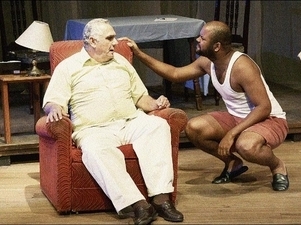
Agent Fitz (Munair Zacca, left) and writer Perceval Porter (Karl Williams) have an emotional consultation in 'Dinner With Eleanor', directed by Eugene Williams. - Nathaniel Stewart/Freelance Photographer
In August, several Jamaican practitioners and lovers of theatre received an email message which began: "After about 14 years I have finally found time to direct a play."
A sense of poignancy is inherent in the statement, certainly. But for the recipients there was also irony, a feeling that all was not right with the world. How could it be, when the sender of the email was one of the region's most respected theatre directors, Eugene Williams?
His Jamaican productions include such classics as The Cherry Orchard, Waiting for Godot, A Streetcar Named Desire, The Black Jacobins, Playboy of The West Indies and An Echo in The Bone. And he has directed many of the island's leading actors, including Leonie Forbes, Charles Hyatt, Carol Lawes, Honor Ford-Smith, Winston Bell, Owen 'Blakka' Ellis, Barbara McCalla Lee and Lloyd Reckord.
As a dramaturg, he has worked with some of the Caribbean's foremost playwrights, two being Jamaica's Trevor Rhone and Dr Michael Gilkes of Guyana.
Though Williams, a Ford Foundation and Fulbright scholar with an MFA in directing (from Brooklyn College) and an MA in Performance Studies (from New York University), had not been directing for 14 years, he has been very busy - as director of the School of Drama, Edna Manley College, and with teaching.
short course
One of his teaching subjects is, not surprisingly, directing, and his regular students attend the drama school. Over the summer, though, even while he was directing his latest play (Amba Chevannes' Dinner with Eleanor), Williams mounted a four-week directing course for theatre professionals.
Participants included such wellknown names as Christopher 'Johnny' Daley, Nadean Rawlins, Michael Daley of MADKOW productions, Douglas Prout (actor, director, designer and president of Montego Bay's MLTM), Carolyn Allen (the then coordinator of the Philip Sherlock Centre for the Creative Arts), actress-director Jean Small and Dawn Bennett, director of Eagles Christian Theatre Troupe. So successful was it that it could be the first in a series of summer courses for professional as well as not-for-profit theatre practitioners.
The Sunday Gleaner interviewed Williams about the thinking behind the course and, considering the participants' enthusiastic feedback he received, his plans for the future.
Was the course run because you think directors in commercial theatre are doing a poor job?
The workshop was designed for participants with some experience in theatre, given the level of analysis that had to be done and the breadth of aesthetic awareness that directing demands. It sought to provide a toolkit and a systematic approach to the process of conceptual analysis and staging of a play. Emphasis was placed on the initial process, getting the production concept. In addition, we managed to look at elements of stage composition and transferring the conceptual action of a scene into the initial stages of the actor's work. The hope is that the participants did leave with a toolkit and an appetite for quality work in their various areas of work in the theatre.
Were the objectives met, from your point of view?
There are a few very competent directors in the local commercial theatre who can or will help playwright and play towards a meaningful production. However, my interest is in 'not for profit' theatre, which for me includes not only the professional companies who manage to produce against great odds, but also church groups and community-based groups who are committed to a theatre of education and transformation-theatre that addresses some of the social and psychological maladies of our society in an arresting way.
What did you think of the level of the students' response to your instructions?
I think that the objectives of the workshop were met for the most part. The very high level of intellectual interaction and the aesthetic sharpness of the participants were among the main reasons for this.
Do you plan another course for next year? If so, in what?
I would certainly like to have another workshop next summer, perhaps for the same group of persons, because I don't think that there are too many persons who would want to learn the craft, given the majority of the popular fare. The School of Drama has advertised evening and summer courses ad nauseam, and only one or two persons have turned up.
more at dramaturgy
The follow-up course will probably look more at dramaturgy, which helps the playwright to improve his/her play. In this case, we may use some works that have already been produced locally. This is often a good way to learn playwriting and directing. I also want to have a workshop on an approach to collective creation and creating from the Caribbean aesthetic - 'an' approach, not 'the' approach.
Workshop participants directed scenes from The Crime of Anabel Campbell by Dennis Scott, a one-act tragedy about the murderous revenge taken by a wronged woman on her husband and his girlfriend. Each director used fellow participants as actors.
Williams has been director of the School of Drama for the past 12 years. He has more than 30 years of experience in the theatre, starting in his native Guyana where he was a leading actor at the Theatre Guild Playhouse. He appeared in King Lear, Dream on Monkey Mountain, A View from The Bridge and A Streetcar Named Desire, among other plays.
His passion for theatre led him to pursue studies in Jamaica at the then Jamaica School of Drama in 1978.
Williams, in announcing that the Drama School is shortly to mount a 12-week workshop for directors in the JCDC drama competition, added, "it's so badly needed".